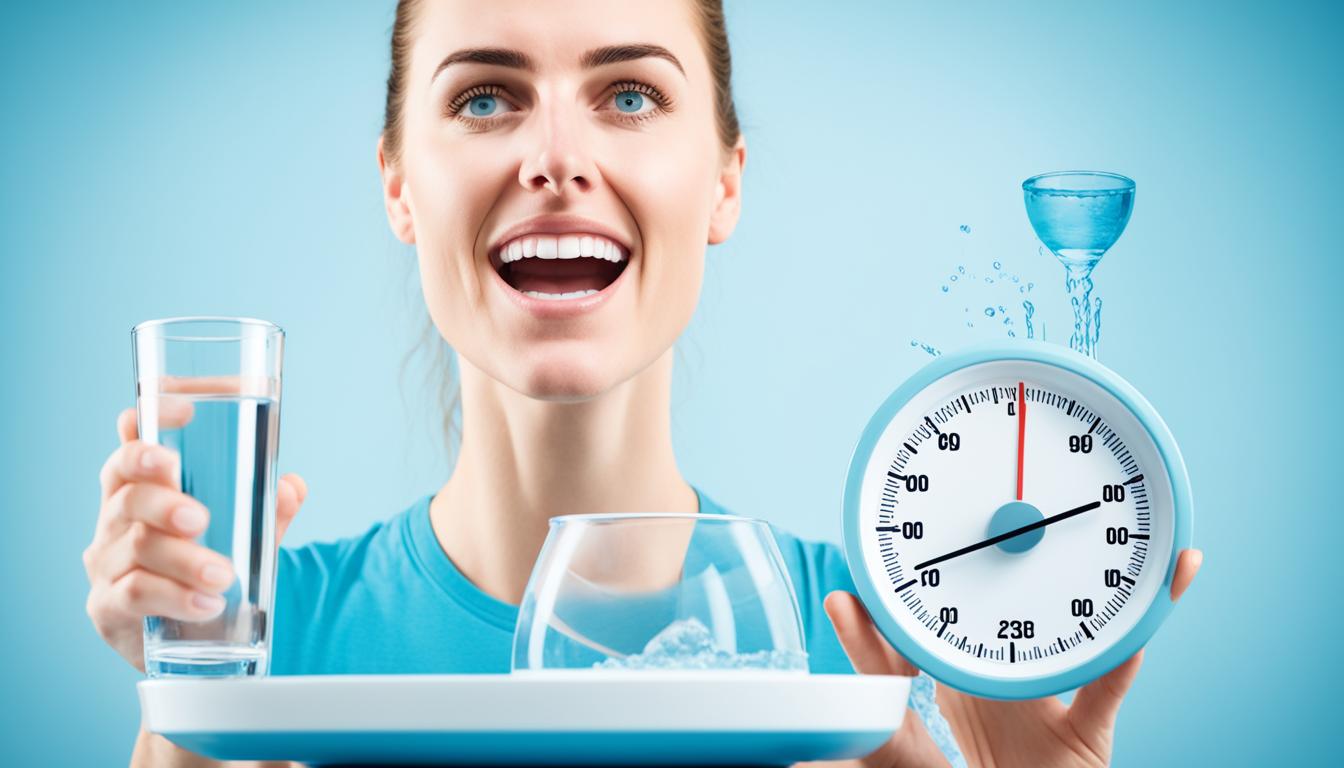Water fasting means drinking only water for a certain time. It’s becoming popular for its health perks. This guide will cover how to safely try water fasting for weight loss and share useful tips.
People try water fasting for its benefits like losing weight, detoxing, and better health. But, it’s important to plan carefully and know the risks. We’ll look into how water fasting works and what studies say about its good and bad points.
Key Takeaways
- Water fasting can help lose approximately 0.9 kg per day within 24 to 72 hours.
- Significant reductions in blood cholesterol and triglycerides after a 24-hour fast.
- 82% of individuals with high blood pressure saw improved levels after 14 days of water fasting under supervision.
- Fasting might increase uric acid production, affecting conditions like gout.
- High risk of dehydration and orthostatic hypotension during prolonged water fasting.
Introduction to Water Fasting
Water fasting has become more popular in recent years. People do it for health and spiritual reasons. It’s important to know what it involves, its history, and how it’s used today before trying it.
What is Water Fasting?
Water fasting means not eating or drinking anything except water for a certain time. It’s seen as a way to clean the body by removing toxins. But, it’s important to know the dangers of water fasting like dehydration and health problems. Always start it with a doctor’s advice, especially if you have health issues.
Historical Background
Water fasting has been part of many religious and cultural traditions. Many faiths see it as a way to connect with the spiritual and purify the body. Our ancestors saw it as a way to refresh both body and soul.
Modern Applications
Now, water fasting is used in health and wellness too. It’s used for losing weight and helping with health issues. Studies show it can make insulin work better and help with type 2 diabetes. It can also lower heart disease risk by reducing bad fats in the blood.
The health benefits of water fasting are big, but we must be careful. The risks are real, especially for those with health problems. Always talk to a doctor before starting to fast.
Looking into the health perks of water fasting is good. But, we must be careful and responsible. When done right, it can be very beneficial for our health.
Health Benefits of Water Fasting
Water fasting means not eating and only drinking water for a few hours up to 72 hours. This can lead to many health benefits. These benefits come from autophagy, less inflammation, and possibly living longer. Let’s look at how water fasting helps with cell health and overall well-being.
Autophagy and Cellular Recycling
Water fasting triggers autophagy, a process where the body gets rid of damaged cells and makes new ones. This is key for keeping cells healthy and lowers the risk of diseases like cancer and Alzheimer’s. Studies show autophagy cleans the immune system, helping with longevity and better metabolic health.
Reduction in Inflammation
Water fasting can lessen inflammation, helping those with chronic inflammation. This can lower the risk of heart disease, diabetes, and arthritis. It shows water fasting can boost cell health and cut down on oxidative stress, which helps with inflammation.
Enhanced Longevity
Research links water fasting to living longer. It can make insulin more effective and help control blood sugar, which prevents diabetes and heart disease. Studies on fasting, including water fasting, show it can increase life span and boost health. For example, those studied had less body fat and better blood pressure and cholesterol levels, key for a long, healthy life.
In conclusion, water fasting has many health perks like boosting autophagy, reducing inflammation, and possibly living longer. But, it’s important to be careful with it. Always talk to health experts to make sure it’s right for you.
| Health Benefit | Description |
|---|---|
| Autophagy | Clears out old and dysfunctional cells, promoting cellular health. |
| Anti-inflammatory Effects | Reduces chronic inflammation, alleviating conditions like arthritis. |
| Enhanced Longevity | Improves markers such as blood pressure and cholesterol, supporting a longer life. |
Water Fasting for Weight Loss: What You Need to Know
Water fasting is getting popular for losing weight fast. But, it’s important to know that the weight loss comes from water, carbs, and muscle, not just fat. This might not be what we want for weight loss. So, understanding water fasting is key before trying it for weight loss.
Studies show both good and bad sides of water fasting. A 2018 study found it helped lower blood pressure, weight, and stress levels. Another study in 2017 said it could reduce stress that leads to diseases.
A 2021 study with 12 men showed big changes in their bodies after an 8-day fast. But, a 2022 study with 48 people found weight loss, but many stopped due to side effects like tiredness and headaches.
| Study | Participants | Duration | Results |
|---|---|---|---|
| 2018 Small Study | Volunteers | 11 Days | Reduced blood pressure, body weight, and oxidative stress |
| 2021 Study | 12 Middle-Aged Men | 8 Days | Changes in blood/urine markers, reduced weight |
| 2022 Study | 48 Overweight/Obese Individuals | 10 Days | Weight/BMI decrease, high dropout rate due to side effects |
Fasting for weight loss might look good at first, but it can have bad effects. These include tiredness, back pain, and headaches. So, talk to a doctor before starting to make sure it’s safe and right for you. While it can lead to quick weight loss, we should look for better ways that are good for our health too.
How to Prepare for a Water Fast
Starting a water fast needs careful planning. It’s important to get medical supervision, plan your dietary strategy, and set realistic fasting goals. This makes your fasting safe and effective.
Consulting a Healthcare Professional
Before you start fasting, talk to a healthcare professional. They will check your health to make sure fasting is safe for you. This is crucial if you have health issues like heart disease, type 1 diabetes, or if you’re underweight.
Getting medical advice helps create a fasting plan that fits your needs.
Gradual Dietary Adjustments
Changing your diet slowly is key to a good dietary strategy. Begin with smaller, nutrient-rich meals and try intermittent fasting. This helps your body get ready for the fast.
Make sure to drink 2-3 liters of mineralized water each day, as advised by experts.
Setting Realistic Goals
It’s important to set realistic fasting goals. Start with fasting for no more than 24 hours. Longer fasts, up to 72 hours, can be done with medical supervision.
Focus on losing weight slowly, following the CDC guidelines. This method helps you stick to fasting and improves your health in the long run.
The Water Fasting Process
Understanding how water fasting works is crucial for reaching your health goals safely. We’ll cover the best fasting times, how much water to drink, and why it’s key to watch your health closely.
Duration of the Fast
Water fasts usually last from 24 to 72 hours. Some research looks at fasting for 8 to 10 days or longer. A 2021 study found big changes in blood and urine after 8 days of fasting.
But, longer fasts can lead to side effects like tiredness, nausea, and headaches. It’s wise to start with shorter fasts and talk to doctors to stay safe.
Daily Water Intake
Drinking enough water is key during fasting to stay hydrated and support your body. Aim for 2-3 liters of water a day. This helps fight hunger and keeps you from getting dehydrated.
Drinking enough water can also ease fasting side effects like headaches and dizziness.
Monitoring Your Health
It’s vital to watch your health while fasting to catch any problems early. Keep an eye on your blood pressure, energy, and overall health. This can help spot health issues before they get worse.
Check for signs of dehydration or too much weakness. Adjust your daily life to save energy and get enough rest. This helps manage the physical side of fasting.
Potential Risks and Dangers of Water Fasting
Water fasting has many benefits, but it’s important to know the health risks of fasting. These risks can be big if you don’t take it seriously or get medical advice.
Dehydration
Even though you drink water, dehydration is a big risk. It’s key to drink lots of water. Side effects include fatigue, nausea, and trouble sleeping. A 2021 study showed changes in blood and urine, body, and stress levels after an eight-day fast.

Orthostatic Hypotension
Feeling dizzy when you stand up is a common risk of fasting. It happens when your blood pressure drops a lot. Some studies found that up to 90% of people’s blood pressure got better, but they still felt dizzy and weak.
| Side Effects | Percentage of Participants |
|---|---|
| Mood Changes and Migraine Headaches | 35% |
| Disordered Eating Patterns | 50% (dropout rate due to side effects) |
| Physical and Mental Fatigue | 60% |
Aggrevated Medical Conditions
Water fasting can make health problems worse and should be done carefully. People with gout, diabetes, and eating disorders might see their symptoms get worse. Pregnant women, those with type 1 diabetes, and people who need to take medicine with food are at higher risk. A 2022 study found weight and BMI went down after a 10-day fast, but almost 50% of people stopped because of bad side effects.
Who Should Avoid Water Fasting?
Fasting can be good for health, but it’s not for everyone. Some people need to be extra careful. Those with certain medical conditions or in certain life stages should not fast to stay safe and healthy.
Pregnant and breastfeeding women are at high risk. They need a lot of nutrients, and fasting could harm them and their babies. Also, people with chronic diseases like Type 1 Diabetes should not fast. It can cause big changes in blood sugar levels, which is dangerous.
The elderly and children should also avoid fasting. Older people need steady nutrients because their metabolism changes. Children need food all the time for growth and development. So, fasting is not safe for them.
Those with eating disorders like anorexia or bulimia should not fast. It could make their conditions worse. Also, people taking certain medicines, like for heart issues or chronic illnesses, should talk to a doctor before fasting. These medicines work better with regular food.
| Group | Risks Involved |
|---|---|
| Pregnant or Breastfeeding Women | Compromised Nutrition for Both Mother and Baby |
| Individuals with Type 1 Diabetes | Severe Blood Sugar Fluctuations |
| Children | Impeded Growth and Development |
| Elderly | Increased Risk Due to Changing Metabolic Needs |
| Individuals with Eating Disorders | Exacerbation of Psychological and Physical Health Issues |
| Patients on Medication | Medication Efficacy Compromised Due to Lack of Food Intake |
While water fasting has its benefits, it’s not good for everyone. Knowing who should avoid it helps us make smart health choices.
Post-Fast Guidelines
Finishing a water fast is a big achievement. But, it’s important to ease back into eating. Here are some key tips for a smooth transition and long-term health.
Reintroducing Food Gradually
After fasting, your digestive system needs time to adjust. Start with foods that are easy to digest, like soups, broths, and smoothies. Always follow refeeding guidelines to avoid any negative effects.
Avoiding Processed Foods
Stay away from processed foods after fasting. They’re often full of preservatives, sodium, and unhealthy fats. Stick to foods like fruits, vegetables, and whole grains for better health.
Monitoring for Refeeding Syndrome
Be careful not to get refeeding syndrome, a condition from eating too much too soon. It can mess with your fluids and electrolytes. Watch for signs like fatigue, weakness, and an irregular heartbeat. Follow refeeding guidelines closely to stay safe.
Remember, easing back into eating is key to keeping the good effects of fasting. Avoid processed foods and watch for signs of refeeding syndrome to protect your health.
Water Fasting vs. Intermittent Fasting
Water fasting and intermittent fasting are two different ways to fast. Each has its own benefits and ways to fit into your life. It’s important to pick a method that matches your goals and lifestyle for safety and success.

Main Differences
Water fasting means you only drink water for a few days, usually 3 to 5 days. Intermittent fasting (IF) is about eating and fasting in cycles over a 24-hour day. For instance, alternate-day fasting means eating normally one day and eating very little or not at all the next.
Another type of IF is the 5:2 diet. You eat normally for five days a week and fast for two days, eating very little.
Relative Benefits and Risks
Both fasting methods have benefits. Water fasting can help with detox and repair cells after 48 hours. Intermittent fasting can help control blood sugar and lower inflammation, which can prevent diseases like Alzheimer’s and arthritis.
But, each method has risks too. Water fasting can lead to dehydration and is harder to keep up with. Intermittent fasting might make you feel hungry, tired, and have headaches.
Which One is Right for You?
Think about your health, lifestyle, and goals when picking a fasting method. Water fasting is good for quick detox and losing weight, great for short-term goals. Intermittent fasting is easier to keep up with long-term and helps with inflammation and blood sugar control.
| Aspect | Water Fasting | Intermittent Fasting |
|---|---|---|
| Duration | 3-5 days | Variable: 12-22 hours fasting windows |
| Health Benefits | Detox, autophagy, weight loss | Reduced inflammation, improved insulin sensitivity |
| Common Side Effects | Dehydration, fatigue | Hunger, fatigue, insomnia |
| Long-Term Sustainability | Low | High |
Tips for a Successful Water Fast
Starting a water fast can be rewarding if you follow the right steps. It’s important to take care of your body during this time. Here are some tips to help you stay healthy and hydrated during your fast.
Staying Hydrated
Drinking enough water is key during a water fast. Experts suggest drinking eight 8-ounce glasses of fluids each day. Men might want to aim for 13 cups, and women for 9 cups of water daily.
This helps prevent dehydration and keeps your body running smoothly.
Getting Plenty of Rest
Getting enough sleep is crucial for fasting. Try to fast during times when you’re not stressed and avoid hard workouts. This lets your body heal and recover from the fast.
Good sleep helps your fasting go better and keeps you feeling good.
Listening to Your Body
Listening to your body is a top tip for fasting. Watch out for signs like dizziness, weakness, or nausea. If these get worse, get medical help right away.
By paying attention to your body, you can make fasting safer and more effective.
For more tips and info, including how hemp oil and seeds can help your fast, check out this detailed resource.
| Water Fasting | Intermittent Fasting | |
|---|---|---|
| Duration | 24-72 hours, up to 5 days | Various methods, e.g., 16:8, 5:2 |
| Benefits | Increased testosterone, HGH, inflammation reduction | Reduced calorie intake, improved metabolic health |
| Risks | Dehydration, nutrient deficiency | Irritability, fatigue |
Conclusion
Water fasting has both good and bad sides. Many people lose weight quickly, about 0.5-1 lb a day. But, it’s important to look at why you gained weight in the first place. This could be from eating poorly, being stressed, not sleeping well, or not moving much.
Just fasting won’t help you keep the weight off. You need to change your whole lifestyle. This means eating better, managing stress, sleeping well, and being more active.
It’s crucial to talk to a doctor before starting any fasting plan. Fasting can lead to a lack of important nutrients. This can mess with your hormones and how your body uses energy. Also, the weight loss at first is mostly water, not fat. If you fast for too long, you might lose muscle and your metabolism could slow down.
If you’re thinking about trying water fasting, start eating normally again slowly to avoid stomach problems. Working with a doctor can help make a safe plan for losing weight. The best way to keep weight off is a mix of eating less, exercising, and changing your lifestyle for the better. This way, you’ll stay healthy and well for a long time.
Source Links
- Water fasting for weight loss: Benefits and risks
- Water Fasting: How It Works, Benefits, and Dangers
- Fasting Explained: Types, Tips, Safety, and More
- Is Water-Only Fasting Safe?
- What Is Water Fasting? Benefits, Risks And More
- Water Fasting
- What Is Water Fasting And Should You Try It?
- Water Fasting: Benefits and Risks
- Water Fasting: Weighing the Benefits and the Risks
- Water fasting: Benefits, risks, and how to do it
- Should You Try Water Fasting?
- Water Fasting: Is It Safe? Is It for You?
- Fasting for Weight Loss | Safety Tips and More | Beaumont
- Water Fasting: Benefits, Risks, and How to Do It Correctly – Perfect Keto
- 48-Hour Fast: How-To, Benefits, and Downsides
- 7 ways to minimize weight gain after a fast
- Intermittent Fasting 101 — The Ultimate Beginner’s Guide
- Is intermittent fasting good for you?
- Water Fast vs. Intermittent Fasting | Raleigh Natural Wellness
- How to Fast Safely: 10 Helpful Tips
- The Water Fast: How to, Benefits, and Tips for Success
- Perform a Water Fast: Safe Guidelines for Beginners
- Water Fasting For Weight Loss- Benefits and Risks | Vecura
- The Truth About Water Fasting for Weight Loss | Fittr




